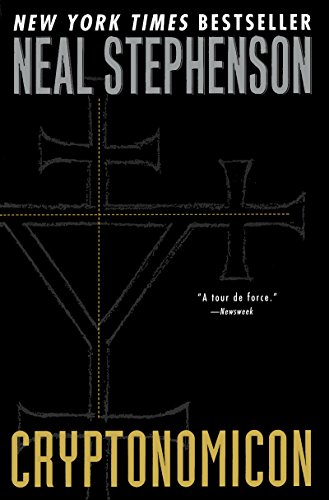Lately I’ve been reflecting on a recent editorial by historian and best-selling author Yuval Noah Harari, who argues that free will is an illusion and human beings are now more “hackable” than they ever have been before. In light of these realities, he says, we must defend as well as rethink the liberal institutions of democracy—and religion has no place in this process.
“I don’t know where the answers will come from,” he writes, “but they are definitely not coming from a collection of stories written thousands of years ago.”
I have great respect for Harari, but he is wrong on this point; I will write more on that soon. Here I just wanted to mention that his editorial reminded me of a certain literary passage which illustrates in a small but vivid way why traditional religious belief is crucial to society no matter what its present challenges. The passage is from Cryptonomicon, an award-winning novel by sci-fi / speculative fiction author Neal Stephenson.

A bit of context: protagonist Randy Waterhouse and his love interest Amy Shaftoe are on their way to a town where Randy once lived with his ex-girlfriend Charlene. Their purpose is to gather up some of Randy’s old belongings. Upon arrival, however, Randy finds that a number of his former acquaintances in the area are disdainful, judgmental, or outright hostile towards him because they believe he treated his ex-girlfriend poorly. The only locals who show him any kindness are Scott and Laura, both of whom (much to the reader’s amusement) are characterized as closet Christians in a highly liberal academic environment. Here’s the passage:
Randy and Amy had spent a full hour talking to Scott and Laura last night; they were the only people who made any effort to make Amy [Randy’s love interest] feel welcome. Randy hadn’t the faintest idea what these people thought of him and what he had done, but he could sense right away that, essentially that was not the issue because even if they thought he had done something evil, they at least had a framework, a sort of procedure manual, for dealing with transgressions. To translate it into UNIX system administrator terms (Randy’s fundamental metaphor for just about everything), the postmodern, politically correct atheists were like people who had suddenly found themselves in charge of a big and unfathomably complex computer system (viz. society) with no documentation or instructions of any kind, and so whose only way to keep the things running was to invent and enforce certain rules with a kind of neo-Puritanical rigor, because they were at a loss to deal with any deviations from what they saw as the norm. Whereas people who were wired into a church were like UNIX system administrators who, while they might not understand everything, at least had some documentation, some FAQs and How-tos and README files, providing some guidance on what to do when things got out of whack. They were, in other words, capable of displaying adaptability. (p. 728)
Now, of course this passage is not some elaborate argument for the veracity of Christianity. Nor is it suggesting that non-religious people cannot be generous or good. What it shows is that religion provides a robust moral foundation for how to live together and love others even if those “others” are strangers or enemies. Far from being fantastical or irrelevant, such frameworks have stood the test of time (and indeed show signs of increasing rather than decreasing) and offer unparalleled resources for functioning in a pluralistic society facing an uncertain future—resources which secular ethical frameworks simply cannot match. I believe this is a point that Dr. Yuval Harari would do well to consider.
Admittedly, it is a complex point, and this brief post can’t do it justice. For an in-depth yet highly accessible treatment, I recommend Tim Keller’s Making Sense of God: An Invitation to the Skeptical. For a shorter read, and one that is more directly applicable to Harari’s concerns, I suggest Science and the Story We Need, a 1997 essay by the famous media scholar Neil Postman. Both Keller and Postman make a strong case for why science and reason alone cannot give us the foundation we need to navigate our chaotic times. Postman in particular insists that science and religion can, and must, cooperate—and in fact are uniquely positioned to do so. We abandon one or the other at our peril.
Thank you for sharing Harari’s article Richard, what a read! And what a grim future expect us if we fail to react adequately to the threats facing our democratic societies in the age of technologically advancing liberalism. I agree that a solid moral foundation and faith in God are basis of resilience that would eventually protect us from corporate aspirations aiming at our most precious virtue – the freedom of will.
LikeLike
Thanks for your comment, Dimitar. I hope to share a more in-depth response to Harari’s article soon — stay tuned!
LikeLike
Seems a lot of folks don’t grasp the fact that any system that has withstood the test of time has proven that it works, as opposed to any number of theories one might spin to replace the former system. “But this way is more fair!” “But the old way is discriminatory!” — overlooking the plain fact that we do not yet know the real-world effects of the shiny, new scheme.
LikeLiked by 1 person
Yes. We often fall into the mindset that C.S. Lewis calls “chronological snobbery,” meaning that we have a tendency to believe that what was in the past was mainly the product of ignorance and/or superstition, and of course we’re so much more enlightened today.
LikeLike